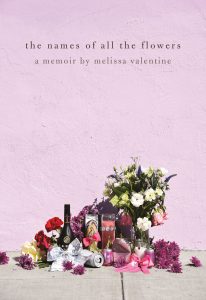 Review by Lara Lillibridge
Review by Lara Lillibridge
“This book is for all who have touched this and all who suffer in silent trauma and grief either directly or indirectly. Therefore, this book is for all of us.” (5)
Melissa Valentine was born in Oakland, California in 1984 to a white father and black mother. One of six children, they lived “on the edge of prosperity and desolation.” (8) Closest in age to her brother, Junior, Melissa was his playmate and accomplice, growing up in his shadow as they pleaded with each other over and over to “do better.”
Right after getting out of jail and a few weeks before his twentieth birthday, Junior was killed—one of eight homicides that year. In names of all the flowers, Melissa Valentine tells her story and that of her brother with a vibrant and searing pen.
My brother didn’t grow up in what we might imagine when we think of disadvantage, when we conjure the picture and story of a black felon. He came from a two-parent household on the good side of the city. So, what happened? What happened to my family? What happened to my brother? What went wrong? The city happened. The system happened. Survival happened. (6)
Valentine writes about her brother’s descent from innocence:
I am invited only to be the silent accomplice and witness as the something I can’t yet name takes my brother, its long and gnarly fingers grabbing at him, little by little scratching away at his innocence and playing for keeps. (165)
While she forces us to look deeply, to keep our eyes on the narrator and her family’s descent into trauma and sorrow, she also implores us, “Look how powerful. Look how fast. Look how beautiful.” (164-165)
Valentine’s poetic voice rings poignant and brutal, her words simple and lyrical:
In this space we are transcendent; here, we bear the names of all the flowers. In this space, we are free to bloom—to be big, fragrant, joyful, radiant. It is in this place where I wait for you. You are not a thug or a delinquent or a monster. I am not stupid, a whore, or a fuckup. This is the place I like to see us, the space I want to make for us. (224)
As we watch the narrator grow up and walk on the tightrope between obedient and rebellious, strong and fragile, we can’t help but see ourselves alongside her.
“We are all locked up, whether our shackles be made of manhood or violence or our families or our schools or the color of our skin or our bodies.” (250)
She reminds us always of the universality of violence, how easily it could be any one of us, how the trauma of violence is more than generational, it is in the earth and each one of our cells. It does not end, but rather, “this story is alive and ongoing.” (10)
But it is also a narrative of hope. Valentine bears witness to collective sorrow for all black lives lost, yet also is determined to find some joy alongside the sorrow. She writes, “This book is my love letter to those who mourn every day.” (6) Valentine offers not that everything will be better, nor that grief will fade, but that we will learn to coexist with it inside us.
“The flowers themselves are prayer to me: You will be okay. I want to embody the blooms, the beauty of them, and transfer them to my family, to Junior and to all the boys like him, to all the ones in prison, to the ones in the street who believe they’re free but are not, to the mothers and the fathers and the sisters and the brothers. You are beautiful. I see you. Look how beautiful you are.” (272)
About the Author: Melissa Valentine is a writer from Oakland, CA. She earned her BA from Sarah Lawrence College and her MFA in creative writing from Mills College. She has been a fellow at the San Francisco Writers’ Grotto, and her work has appeared in Jezebel, Guernica, Apogee Journal, and others. Her writing has received honorable mention from Glimmer Train and the Ardella Mills Non-fiction Award. She currently lives in Brooklyn, NY. (Bio courtesy of FeministPress.org)
the names of all the flowers: a memoir by Melissa Valentine
The Feminist Press. 2020. 307 pages, $17.95 [paper]
ISBN: 9781936932856
Lara Lillibridge is the author of Mama, Mama, Only Mama (Skyhorse, 2019), Girlish: Growing Up in a Lesbian Home (Skyhorse, 2018) and co-editor of the anthology, Feminine Divine: Voices of Power and Invisibility (Cynren Press, 2019).
